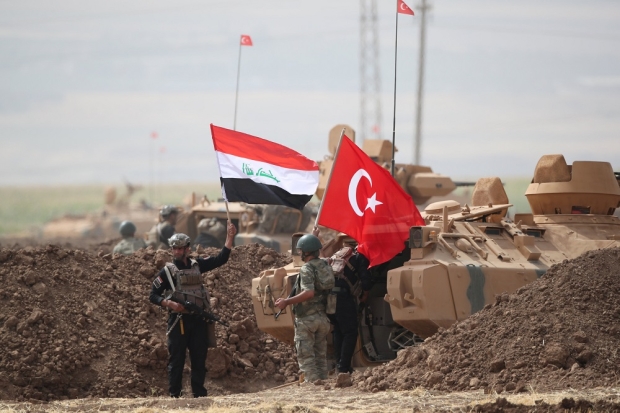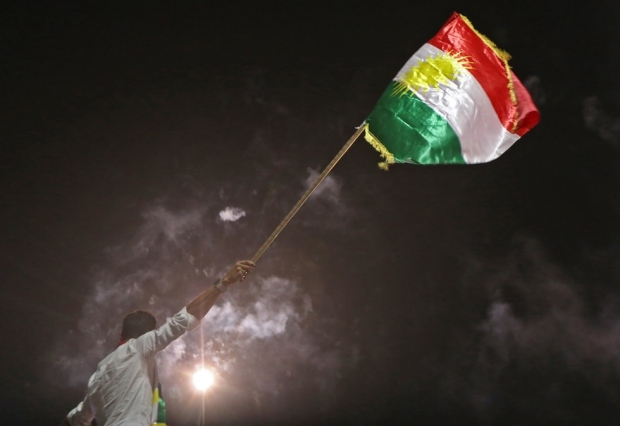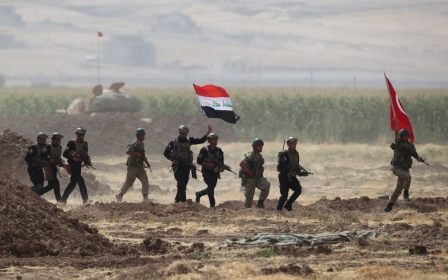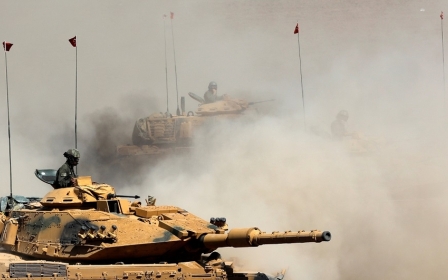ANALYSIS: Tanks or no tanks, Erdogan faces pressure at home over Kurd vote
ISTANBUL, Turkey – The war drums are beating. The tanks are lined up on the border. The threats are loud and fierce. Economic reprisals are promised.
Yet Ankara doesn't appear likely or even willing to go past the bluster as far its resistance to the Kurdish referendum on future independence in northern Iraq is concerned.
This is despite the Turkish state always seeing such an eventuality as potentially posing the largest threat to Turkey's own territorial unity.
The Kurdish people voting for the AK Party care about Turkey's security as well. They do not make decisions based on ethnicity,
- Suheyb Ogut, Bosphorus Global
One of the reasons cited for this is the need of the Turkish president, Recep Tayyip Erdogan, and his ruling Justice and Development Party to keep both the country's Kurds and nationalists on side to ensure his political ambitions are achieved.
Suheyb Ogut, executive director at Bosphorus Global, a think-tank closely associated with the presidency, told Middle East Eye that Erdogan's stance on the Kurdish referendum was in response to national security concerns. He did not think the country's Kurds believed differently.
"The Kurdish people voting for the AK Party care about Turkey's security as well. They do not make decisions based on ethnicity," said Ogut. "If they did, they would have been voting for other parties."
Erdogan needs to win more than 50 percent of the vote in an election due in 2019 to constitutionally consolidate his grip on the country.
The April referendum saw Erdogan and his AKP's bid to abolish the country's parliamentary system for an executive presidency endorsed by a narrow margin of 51.4 percent.
The failure to manage a comprehensive win – despite creating a very uneven playing field hugely in favour of the government camp – has Erdogan's team and the AKP management worried about the crucial 2019 election.
Whoever is president after the next election will be granted wide-ranging executive powers.
Some commentators believe Kurdish votes cast in April favouring Erdogan's executive presidency helped push him over the line and avoid a crippling defeat.
This view gained strength after taking into consideration that Erdogan lost the country's major cities, including Istanbul.
That usually results in losing elections or referenda on a nationwide scale, but more than a million votes from the Kurdish southeast tilted the balance where the difference was only about 1.5 million votes.
And these Kurdish votes came despite Erdogan's strong shift towards nationalists since 2015, and a stance that has only become more hard-line.
Erdogan's calculus
Mehmet Kaya, the head of the Tigris Communal Research Centre, a think-tank based in Diyarbakir, told Middle East Eye that Erdogan never makes uncalculated moves and this time was no different.
"These threats against the referendum are a continuation of the anti-Kurdish path Erdogan has chosen. It is part of his attempt to please right-wing nationalists from the MHP. He has calculated his vote loss and gain but is driven by anti-Kurdish sentiments," said Kaya.
One simple calculation is that right-wing nationalists, such as those from current AKP ally Nationalist Movement Party (MHP), are numerically more than potential Kurdish voters.
Ogut, on the other hand, said the difference lay in the way Erdogan interpreted nationalism and his "non-chauvinistic, non-discriminatory and non-exclusionary" version of nationalism meant Turkey's Kurds didn't feel alienated.
It is part of his attempt to please right-wing nationalists from the MHP
- Mehmet Kaya, Tigris Communal Research Centre
The margins, however, are fine.
Grumblings of dissent from within the ranks of the ruling party's own ethnically Kurdish MPs over the harsh and punitive tone adopted against Massoud Barzani's Kurdish regional government could also hurt Erdogan in upcoming elections.
Many of those MPs played a crucial role over the years in developing a strong working relationship between the AKP and Barzani's KRG.
It helped to enhance their standing in the local community while also presenting the possibility of an alternative Kurdish model to the Kurdistan Workers' Party (PKK), listed as terrorist by Turkey, the US and the EU and which has been engaged in an armed conflict against the Turkish state since 1984 at a cost of more than 40,000 lives.
'Kurdish anger'
"It is not the fury directed at Barzani that has AK Party's Kurdish MPs furious. It is the general increase in anti-Kurdish sentiment by Erdogan and the party that has made them very angry," said Kaya.
Kaya, who was in northern Iraq on Monday to observe the referendum, said the threats from Turkey would quite likely to affect how many of Turkey's Kurds vote in the future.
"It was a celebratory atmosphere with Kurds from all over the world arriving to witness a historic moment when the first steps towards Kurdish statehood were taken," said Kaya.
"There were many Kurds from Turkey who had travelled there as well and they were all very proud to be able to be there on that historic day."
I don't think Erdogan fears a backlash from Turkey's Kurdish voters.
- Suheyb Ogut, Bosphorus Global
For Ogut, Erdogan's tough position is based purely on what he considers expansionary plans of the KRG that target Turkey's territorial integrity and shouldn't be construed as threats.
"First of all, there is a threat to Turkey's territorial integrity if we look at the map launched by some pro-KRG outlets," said Ogut.
"What President Erdogan said was just a response to this, not a threat per se. As far as I can see, I don't think Erdogan fears a backlash from Turkey's Kurdish voters."
Economic retaliation and blowback
Putting aside threats of military action, Kaya believes threats of economic retaliation, too, will hurt Turkey just as much as Iraq's Kurds.
Iraq is one of Turkey's largest export markets, with northern Iraq the destination for the lion's share of those exports. Turkey's ties with its other top export markets, Germany and the United States, are very troubled as well.
In the past, the loss of one market, even one as large as the Iraqi one, would not have impacted Turkey. But the Turkish economy has constantly been losing markets since the Arab Spring of 2010.
The lucrative north African markets of Libya and Egypt have been lost. In the Middle East, Turkish businesses has increasingly limited access to the Syrian, Jordanian and Lebanese markets.
A one-year long period of Russian economic retribution hurt Turkey as well, and its vital tourism industry has just started recovering after receiving multiple blows over the last few years.
Any action to disrupt trade with the Kurdish administration in northern Iraq will also deal a blow to the livelihoods of many of Turkey's Kurds in the border region who have come to rely on the thriving trade in this largely underdeveloped region.
Conservative Kurds residing in Turkey's major cities like Istanbul who might have previously voted for the AKP and Erdogan could also change their minds after seeing the reaction to the referendum in northern Iraq, according to Kaya.
"This was a major moment for Kurds all over the world. It was a defining moment filled with pride. And Kurds are unlikely to forget those who seek to undermine it using various means," said Kaya.
Even for a politician as shrewd and calculating as Erdogan, this Kurdish referendum and his reaction to it might prove the impossible balancing act as far as domestic calculations go. He has lined up the tanks against Iraq's Kurds, but won't be lining up the thanks anytime soon.
New MEE newsletter: Jerusalem Dispatch
Sign up to get the latest insights and analysis on Israel-Palestine, alongside Turkey Unpacked and other MEE newsletters
Middle East Eye delivers independent and unrivalled coverage and analysis of the Middle East, North Africa and beyond. To learn more about republishing this content and the associated fees, please fill out this form. More about MEE can be found here.






